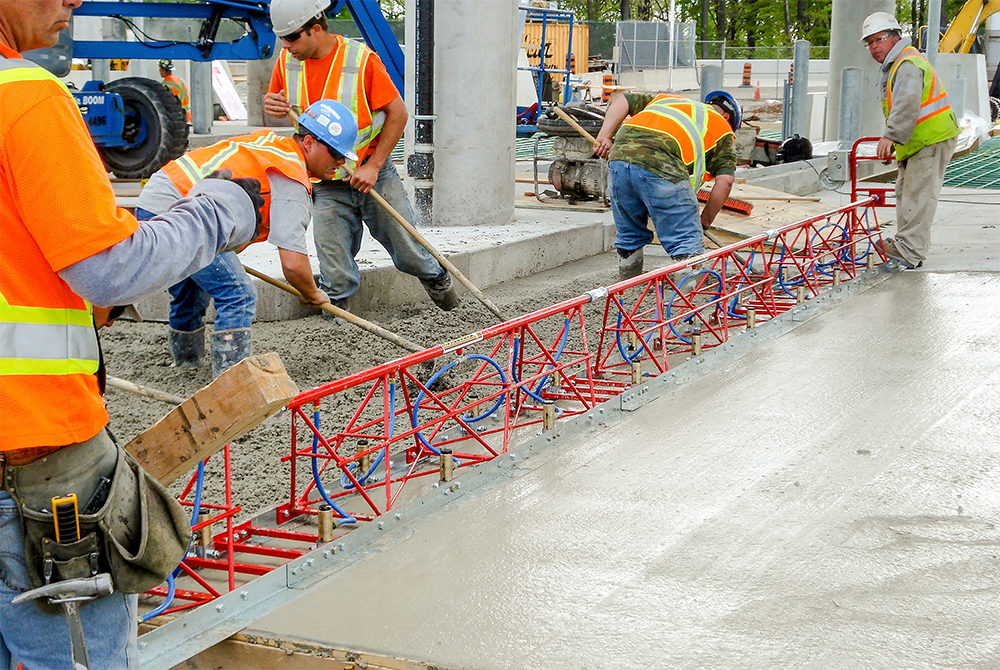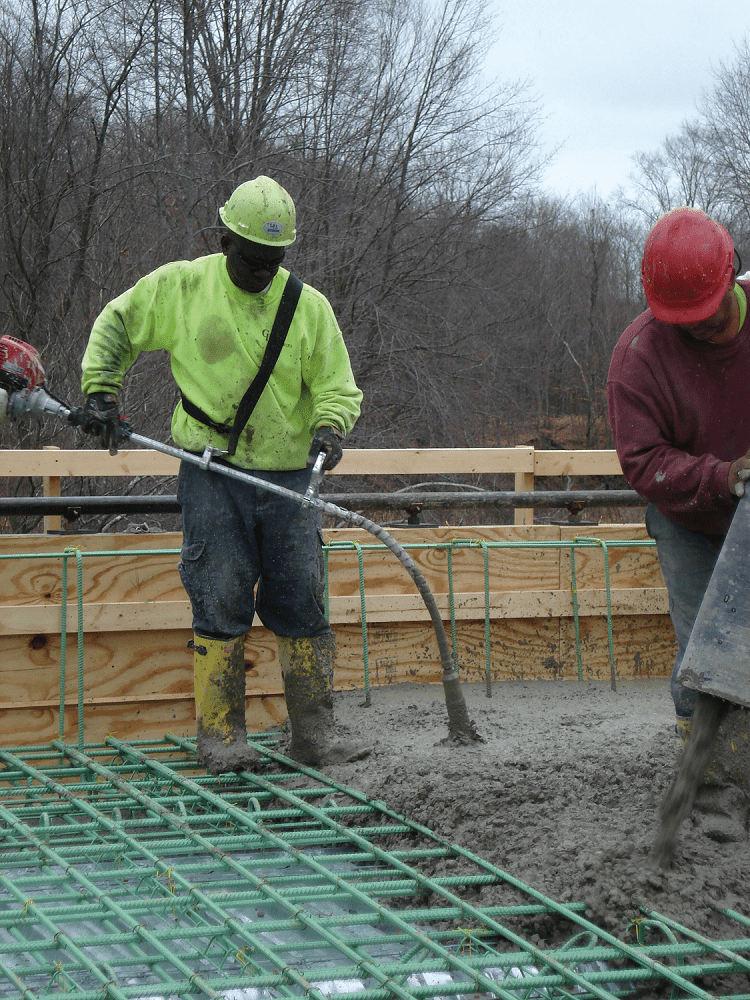Avoid These Mistakes When Hiring West Coast GE Concrete contractors for Your Next Job
Avoid These Mistakes When Hiring West Coast GE Concrete contractors for Your Next Job
Blog Article
The Vital Function of Concrete Structure in Structural Honesty and Long Life
When it involves constructing a residential or commercial property, the foundation is much more vital than you may believe. Concrete foundations offer unmatched stamina and sturdiness, ensuring your framework can stand up to different environmental challenges. Without a solid base, you run the risk of prospective issues like shifting or fracturing, which can endanger safety and security and worth. Recognizing the nuances of concrete foundations can be the trick to protecting your financial investment for several years ahead. What should you think about following?
Comprehending the Significance of Concrete Foundations
Concrete foundations are important to the overall stability of any kind of structure, as they provide the essential assistance required to stand up to numerous loads and ecological problems. When you think of developing a home or a business space, the structure is the first thing you should take into consideration. It serves as a barrier against wetness, shielding your residential property from water damage. A well-placed concrete structure also stops settling and shifting, which can bring about cracks in wall surfaces and floors. You'll want to assure that the foundation is effectively designed and strengthened, as this affects the durability of your structure. Additionally, a strong structure can enhance power performance by decreasing air leakages. Bear in mind, overlooking the value of a concrete foundation can result in expensive fixings down the line. So, purchasing a high quality foundation upfront is important for the integrity and sturdiness of your framework.
Advantages of Concrete Foundations for Architectural Honesty
While numerous variables add to a building's structural integrity, concrete foundations use unparalleled durability and strength. You'll appreciate that concrete can endure severe climate problems, standing up to both dampness and temperature level fluctuations. This resilience means your structure is less likely to experience cracking or shifting over time, which can compromise its safety.Additionally, concrete's fundamental weight offers a solid base, avoiding motion during natural events like quakes or floodings. When you select a concrete structure, you're additionally selecting low maintenance; unlike timber, it will not rot or bring in bugs, saving you time and money in repairs.Moreover, concrete's fire resistance provides added safety and security, guaranteeing your framework can withstand heats without significant damages. On the whole, purchasing a concrete foundation implies you're prioritizing the lasting security and stability of your building, making it a sensible selection for any type of construction task.
Typical Types of Concrete Foundations
When it involves constructing foundations, understanding the usual sorts of concrete foundations can aid you make notified choices for your task. The most widespread types consist of slab-on-grade, crawl space, and complete basement foundations.A slab-on-grade structure is a basic, cost-efficient choice, where a thick concrete piece is put directly on the ground. This kind works well in cozy climates, as it decreases warm loss.Crawl space structures elevate the home a little above ground, enabling ventilation and access to pipes and electrical systems. This design can assist prevent dampness issues.Full basement structures offer extra living or storage space while supplying excellent architectural support. They need even more excavation and are usually made use of in chillier environments to avoid frost heave.
Variables to Consider When Creating a Concrete Structure

Finest Practices for Putting Up Concrete Foundations
When you're setting up a concrete structure, proper website preparation is important to guarantee stability (West Coast General Engineering concrete foundation). You'll additionally require to understand support strategies to enhance stamina and longevity. Finally, don't ignore the healing process, as it plays a fundamental function in attaining a strong foundation
Website Prep Work Relevance
Although it might seem straightforward, correct website prep work is important for guaranteeing a solid and sturdy concrete structure. Begin by clearing the area of any kind of debris, greenery, or organic product that might compromise the structure's stability. Next, analyze the dirt type and compaction; you could need to excavate or include materials to develop a steady base. Level the ground to guarantee also weight distribution and avoid clearing up issues later. Setting up correct drain systems is additionally important to stop water accumulation, which can damage the foundation with time. Lastly, define the foundation's measurements precisely to guide the pouring procedure. By following these actions, you'll establish the stage for an effective concrete foundation that stands the examination of time.
Support Methods Clarified
Once the website is properly prepared, the next action in guaranteeing a strong concrete structure includes applying effective reinforcement strategies. You should start by making use of steel rebar, which provides tensile stamina and aids prevent splitting. Lay the rebar in a grid pattern, making certain it rises utilizing spacers to keep correct coverage. Furthermore, take into consideration using wire mesh for additional assistance, specifically in areas subject to heavy tons. Do not neglect to link the rebar crossways safely with cable. For larger structures, fiber support can boost durability, decreasing the danger of shrinking splits. Constantly adhere to local building regulations and guidelines to guarantee compliance. By applying these reinforcement methods, you'll considerably enhance your structure's toughness and long life, laying a strong foundation for your framework.
Healing Refine Basics
To assure your concrete structure remedies appropriately, it's crucial to keep appropriate wetness and temperature level conditions right away after pouring. Start by covering the surface with a wet cloth or plastic bed linen to maintain wetness. This keeps the concrete hydrated, preventing cracks and making certain stamina. You should additionally keep an eye on the temperature; ideal healing problems are in between 50 ° F and 90 ° F. If it's as well warm, mist the surface area frequently to avoid rapid dissipation. For winter, consider making use of shielding blankets to maintain heat. Go for a curing duration of at the very least seven days, as this is essential for ideal strength growth. By complying with these best techniques, you'll improve your foundation's durability and long life, guaranteeing structural stability for years ahead.
Maintenance of Concrete Structures for Durability
To maintain your concrete foundation solid and long lasting, normal assessments are important. You need to likewise assure efficient water drainage services remain in place to protect against water damages. If you identify any cracks, resolving them promptly will save you from larger troubles down the line.

Regular Inspections and Analyses
While routine evaluations and assessments could appear like a chore, they're crucial for keeping the integrity of your concrete structure. By regularly looking for splits, shifts, or signs of wear, you can capture potential concerns before they rise into pricey repair services. Search for any water pooling around the structure or uncommon settling, as these can signal underlying problems. It's additionally important to keep an eye on any changes in your quikrete stamp house's structure, like doors that stick or windows that do not open smoothly. Keeping a document of your assessments helps track adjustments gradually, permitting proactive upkeep. Eventually, these assessments assure your structure stays secure, sustaining the longevity and safety and security of your entire structure. Do not overlook this essential element of homeownership!
Effective Water Drainage Solutions
Regular assessments can expose concerns like drainage troubles that might compromise your concrete structure's security. To stop water build-up, ensure your gutters and downspouts straight water far from the foundation. Installing French drains can properly reroute surface and groundwater, reducing stress on your structure walls. In addition, rating the soil around your home helps assure that water streams away, rather than merging near your foundation.Consider utilizing sump pumps in areas vulnerable to flooding, as they actively remove excess water. Consistently look for clogs in water drainage systems and clear them immediately. You'll safeguard your structure's stability and longevity by taking these aggressive steps. Bear in mind, efficient drainage options are vital for maintaining a solid, durable concrete structure.
Prompt Fracture Repairs
When you see cracks in your concrete structure, addressing them immediately is vital for keeping its long life. Small fractures can swiftly advance right into larger concerns, compromising the click for source architectural integrity of your home. On a regular basis inspect your foundation for indicators of damage, such as horizontal or upright cracks. If you identify any kind of, quikrete stamp don't wait-- repair them quickly. You can utilize epoxy shots or concrete patching substances, which are effective for securing splits. Always comply with the supplier's instructions and think about getting in touch with a professional for considerable damage. Remember, timely repairs not only improve your structure's durability but likewise conserve you cash in the future by avoiding a lot more considerable repairs down the line. Stay positive, and your structure will certainly continue to be solid and safe and secure.
Addressing Common Problems With Concrete Structures
Concrete structures can encounter numerous issues over time, making it crucial to determine and address them immediately. One of one of the most typical troubles is cracking, which can happen due to temperature changes or clearing up soil. If you discover fractures, it's vital to analyze their size and depth; little splits can commonly be sealed, while larger ones might call for specialist evaluation.Water invasion is another significant worry. Excess moisture can bring about mold growth and architectural deterioration. Warranty correct drain around your foundation to mitigate this risk. In addition, try to find indications of shifting or bowing walls, as this can show underlying problems with your foundation's stability.Regular inspections are basic to capture these problems early. If you spot any kind of concerning signs, do not think twice to speak with a foundation specialist. By staying proactive, you can keep the stability and longevity of your concrete structure, guaranteeing your home continues to be risk-free and protected.
Regularly Asked Concerns
How Does Dirt Type Influence Concrete Foundation Performance?
Soil type significantly influences concrete foundation efficiency. If you've obtained extensive clay, as an example, it can trigger shifting and splitting. Sandy soil may lead to resolving. Understanding your dirt helps assure a stable structure.
Can Concrete Foundations Be Repaired if Damaged?
Yes, you can fix damaged concrete structures. Depending on the degree of the damages, techniques like epoxy shot or piece jacking can bring back security. It's best to seek advice from a professional for efficient remedies.
What Is the Common Life-span of a Concrete Foundation?
A concrete foundation commonly lasts 30 to 100 years, depending on aspects like dirt problems, climate, and upkeep. You'll wish to keep an eye on it to ensure it continues to be in good shape throughout its life expectancy.
Exist Alternative Materials to Concrete for Foundations?
Yes, there are choices to concrete for structures, like steel, timber, or even recycled products. Each alternative has unique benefits and disadvantages, so you need to consider your project's details demands when selecting the best material.
How Does Environment Influence Concrete Structure Resilience?
Climate considerably influences concrete structure durability (West Coast General Engineering Concrete). Extreme temperatures, moisture, and freeze-thaw cycles can weaken the product, bring about splits and architectural concerns. You must take into consideration regional environment conditions when planning your foundation to assure lasting efficiency
Report this page